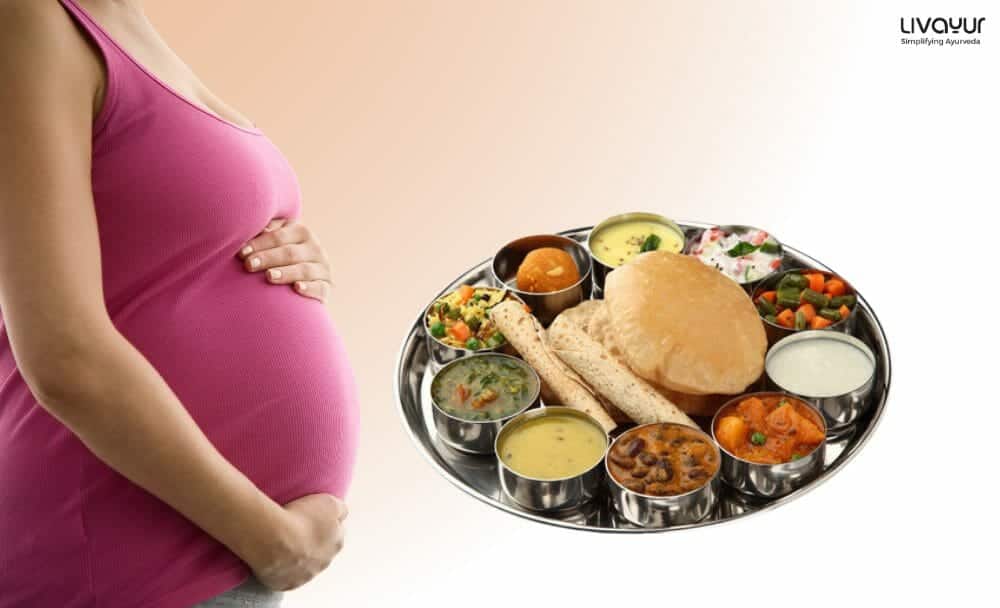Ayurveda treats food as the best source of nourishment and medication for pregnant women. The special diet (which spans 9 months) is singularly unique and exclusive to Ayurveda. This diet changes based on the growth of the fetus within the womb and ensures that the mother stays healthy at the same time.
One may find remnants of this with midwives as well as older women. However, a comprehensive and detailed diet plan is being currently practiced solely by the Vaidyas of the classical medical tradition.
In this article, we are offering a broad expanse of the month-wise diet, which can be successfully modified based on the pregnant woman’s age, constitution, place, season, and digestive fire.
Ahar (Food)
Purusha (or humans) is born and eventually grow from the Ahar Rasa. Therefore, Ahar Rasa must be healthily maintained. The food, as well as behavior, should be such that the Ahar Rasa is completely protected. As the Garbha (or fetus) is a diminutive form of Purusha, the child’s birth and growth depend significantly on the mother’s food and actions.
The food consumed by the pregnant woman does three things:
- Nourishes and helps the fetus’s growth
- Nourishes the body of the mother
- Nourishes the breasts by which the breast milk thus produced maintains the health of the new-born baby
So, the Garbhini (pregnant woman) must follow an extremely careful regimen of food as well as behavior during pregnancy. This regimen is known as “Garbhini Paricharya.”
The fetus’s growth follows a certain growth pattern. Hence, in the 5th month, there is a major growth of Mamsa (or flesh) and Rakta (or blood). In the 6th month, there is an immense development of Bala, nails, Varna, Roma, ligaments, and bones, among others. Accordingly, management of the regimen alters each month based on the “Charaka Samhita.”
Mentioned below are the diet plans for each month of the pregnancy.
1st Month
Cold milk in small quantities but on a frequent basis. Mathur (sweet), Sheet (cooling to the body), and liquid diet are generally preferred in the 2nd month for the health and maintenance of the fetus.
2nd Month
Similar to the first month, during the second month, too, cold milk must be consumed in small quantities but on a frequent basis. Other food items include Madhur, sheet, and a liquid diet that comprises coconut water, milk, fruit juices, and Kanji which has not turned sour. All these must be consumed in small quantities but frequently. Fruits that need to be avoided are pineapple, sugarcane, and papaya.
3rd Month
Rice along with milk or Ghee, and honey with milk along with the same diet as the 2nd month.
4th Month
Butter produced from milk, rice with curd, coconut water, fruit juice, Hridya fruits such as mango, watermelon, yellow pumpkin, white pumpkin, snake gourd (Chichinda), berries, Amratak (ambada), and pomegranate must be consumed.
5th Month
There must be an intake of rice and milk and ghee obtained from butter. Mamsa Vardhak foods (those that promote bulk in the fetus) such as black gram must be consumed. Rakta Vardhak foods (those that increase blood) such as pomegranate, apple, chikoo, guava, spinach, beetroot, and Amalki, among others, should be consumed.
6th Month
There must be an intake of Ghee, rice, Gokharu (Tribulus Terrestris), Siddha Ghee (or processed ghee), and Yavagu (or rice kanji).
7th Month
The diet should be the same in the 7th month. However, there are certain discomforts that may arise during this month. If there is an itching sensation on the woman’s lower abdomen, thigh, or breasts, the following medications are used:
- Berry Kashay, which is processed in sweet medicines and buttermilk
- Kanheri Siddha Oil Massage
- Parishek of Jai, Jeshthamadhu decoction
- Avoidance of salt and large quantities of water
- Consume Bala, Gokharu, Lajjalu, Musta, Nagkeshar powder, and honey
- During this month, all parts of the fetus are extremely well developed
- Consume water chestnut (Trapa Bispinosa), grapes, lotus, sugar, musta, and a Jeshthamadhu decoction
8Th Month
Along with the regular diet, Yavagu in milk should be consumed during the 8th month.
9th Month
The last month is a crucial time, therefore, you must be prepared. Keep your diet healthy, do yoga daily and in case of any minute discomfort, contact your doctor immediately.
Pregnancy Harming Factors
Besides diet, Ayurveda lists out specific factors that can lead to disturbances or harm to the pregnant woman and fetus. These are:
- Traveling on irregular roads or traveling in speeding vehicles
- Sitting on hard, irregular surfaces
- Having intercourse, smoking, or consuming sedatives, wine, or narcotic drugs
- Sleeping in a supine position may lead to the cord twisting around the fetus’s neck
- Consuming fish in vast quantities
- Controlling natural urges
Doing excessive exercise
Pregnancy is, perhaps, one of the biggest milestones in a woman’s life and one of the most beautiful times. It is important that you cherish every moment and prepare, from day one, to bring your child into this world safely and in a healthy manner. You must follow all the instructions of your doctor and consult them before making any dietary or lifestyle changes.
This article is reviewed by Dr. Pawan Kumar Sharma



















